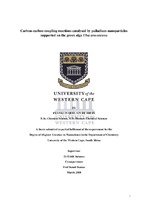| dc.contributor.advisor | Antunes, Edith | |
| dc.contributor.author | De Bruin, Franklin Quelain | |
| dc.date.accessioned | 2018-06-21T08:46:56Z | |
| dc.date.available | 2018-06-21T08:46:56Z | |
| dc.date.issued | 2018 | |
| dc.identifier.uri | http://hdl.handle.net/11394/6076 | |
| dc.description | Magister Scientiae - MSc (Chemistry) | |
| dc.description.abstract | The synthesis of nanomaterials, especially metallic nanoparticles, has attracted an enormous amount of
interest over the past decade. They exhibit unique properties that allow the multiple applications in a
variety of fields in science and technology. Their applications are limited by the efficiency and control
of their synthesis to produce nanoparticles of certain size and shape. With ever mounting concern for
the environment, a great amount of research has recently been extended to synthetic procedures that are
carried out with limited or no toxicity to human health and the environment. One method involves the
use of biological (or biogenic) materials for nanoparticle synthesis. This method is particularly attractive
due to the fact that it is a relatively cheap, simple and environmentally friendly method compared to
that of conventional chemical methods of synthesis. | |
| dc.language.iso | en | |
| dc.publisher | University of Western Cape | |
| dc.title | Carbon-carbon coupling reactions catalysed by palladium nanoparticles supported on the green alga Ulva armoricana | |
| dc.rights.holder | University of Western Cape | |

